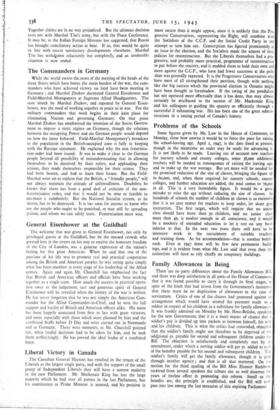Problems of the Schools
Some figures given by Mr. Law in the House of Commons, on Monday, show how unwise it would be to force the pace for raising the school-leaving age. April t, 1947, is the date fixed at present, though in the meantime an order may be made for advancing it. It is not likely to be made. Leaving out of account new teacher' for nursery schools and county colleges, some 38,000 additional teachers will be needed in consequence of raising the leaving age. and to make up the war wastage. But yet more will be needed for the promised reduction of the size of classes, bringing the figure lir to 6o,000, and, when those required for nursery schools, county colleges, and further education are added, the total comes to 70,00e in all. This is a very formidable figure. It would be a great mistake to raise the age without reducing the size of classes. In hundreds of schools the number of children in classes is so excessive that it is no easy matter for teachers to keep order, let alone give instruction. The first target, which will require that no senior class should have more than 30 children, and no junior cla,c more than 40, is modest enough in all conscience, and it would be a mockery of extended education to let it rest on any basi inferior to that. In the next two years there will have to be intensive work in the recruitment of suitable teacher, and training them. As for accommodation—that is another bottle- neck. Even in 1947 there will be few new permanent build- ings, and it is evident from what Mr. Law said that even then the authorities will have to rely chiefly on temporary buildings.


























 Previous page
Previous page